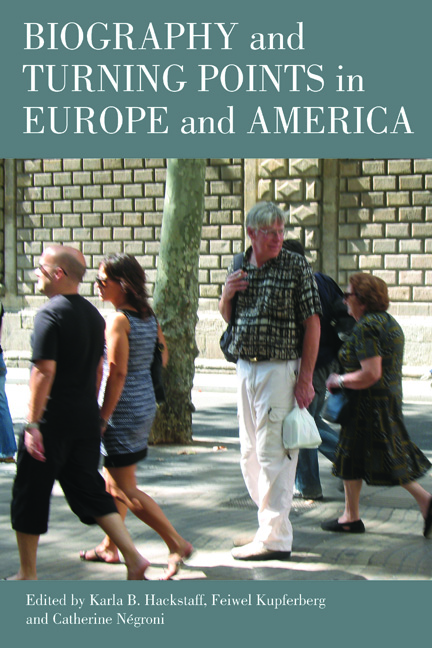Book contents
- Frontmatter
- Contents
- Notes on contributors
- Introduction: Advancing the dialogue on turning points
- one Unpacking biographical narratives: investigating stories of artistic careers in Northern Jutland, Denmark
- two Turning points in the life course: a narrative concept in professional bifurcations
- three Conjugal separation and immigration in the life course of immigrant single mothers in Québec
- four Migration biography and ethnic identity: on the discontinuity of biographical experience and how turning points affect the ethnicisation of biography
- five Biographical structuring through a critical life event: parental loss during childhood
- six Decisive turning points in life trajectories of violence among young men in the barrios of Caracas: the initiation and biographical reconversion to non-violent lifestyles
- seven The turning points of the single life course in Budapest, Hungary
- eight Complicating actions and complicated lives: raising questions about narrative theory through an exploration of lesbian lives
- nine Religious conversion as a biographical turn/ing: the case of Orthodox believers in contemporary Russia
- ten Conclusion: theorising turning points and decoding narratives
- Index
ten - Conclusion: theorising turning points and decoding narratives
Published online by Cambridge University Press: 01 September 2022
- Frontmatter
- Contents
- Notes on contributors
- Introduction: Advancing the dialogue on turning points
- one Unpacking biographical narratives: investigating stories of artistic careers in Northern Jutland, Denmark
- two Turning points in the life course: a narrative concept in professional bifurcations
- three Conjugal separation and immigration in the life course of immigrant single mothers in Québec
- four Migration biography and ethnic identity: on the discontinuity of biographical experience and how turning points affect the ethnicisation of biography
- five Biographical structuring through a critical life event: parental loss during childhood
- six Decisive turning points in life trajectories of violence among young men in the barrios of Caracas: the initiation and biographical reconversion to non-violent lifestyles
- seven The turning points of the single life course in Budapest, Hungary
- eight Complicating actions and complicated lives: raising questions about narrative theory through an exploration of lesbian lives
- nine Religious conversion as a biographical turn/ing: the case of Orthodox believers in contemporary Russia
- ten Conclusion: theorising turning points and decoding narratives
- Index
Summary
What are turning points, and how are they to be described and analysed? How might a stronger focus on turning points help us to advance sociological biography research? This is what this book is about. It combines theoretical work with a number of concrete, empirical analyses of turning points, starting from different theoretical and methodological traditions within the contemporary academic landscape, but nevertheless with the overall conviction that the concept of turning points is a good start, both to make a theoretical contribution and to provide methodological advice (heuristics) on how to go about interpreting biographical narratives.
Sociology and biography research
Traditionally, sociologists who have been interested in biographical narratives have found the concept of ‘turning points’ a good conceptual tool to start with. Whatever turning points mean (a crucial career step, a life crisis, an epiphany, a milestone, the last straw, role exit etc), it points at the crucial nexus between social structure and personal agency that has been at the centre of the sociological knowledge interest. Indeed, a number of central concepts in sociology derive from the use of biographical material.
The ‘Thomas theorem’, or the idea that subjective beliefs are objective in the sense of having real social consequences, was a result of Thomas and Znaniecki's (1918–1920/1923) study of personal letters by Polish immigrants in Chicago sent to the families back home. The idea of the ‘sociological imagination’, coined by C. Wright Mills (1959), argued that biographies make it possible to combine history, society and individual processes of meaning. Berger and Luckmann's (1966) concept, ‘the social construction of reality’, can be seen as a theoretical generalisation of Alfred Schutz's (1973–75) biographically attuned concepts for studying the life world, among them the idea of ‘recipes’ and ‘biographical stocks of knowledge’.
More recently Anthony Giddens’ (1991) concepts of ‘late modernity’ and ‘self-identity’ (which are very close to Ulrich Beck's 1992 concepts of ‘reflexivity’ and ‘risk society’) have been widely used by biography researchers. But where do these concepts come from? It is important to understand our own intellectual history in order to be more critically aware of what concepts mean or bring with them. Giddens and Beck's concepts are not identical; they have different intellectual sources.
- Type
- Chapter
- Information
- Biography and Turning Points in Europe and America , pp. 227 - 260Publisher: Bristol University PressPrint publication year: 2012

